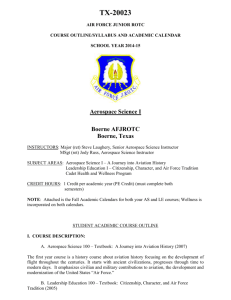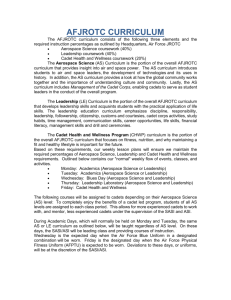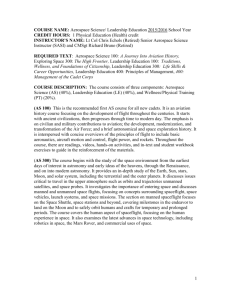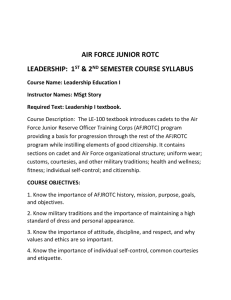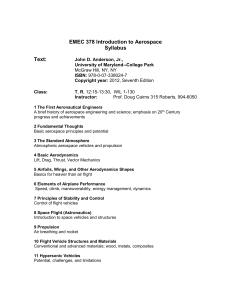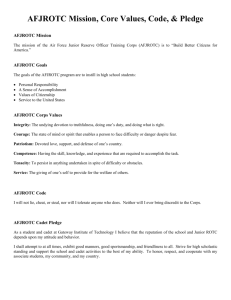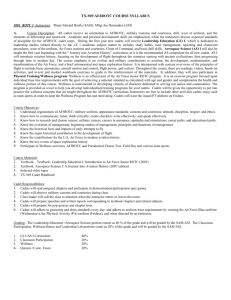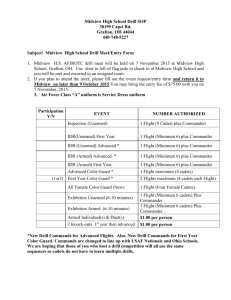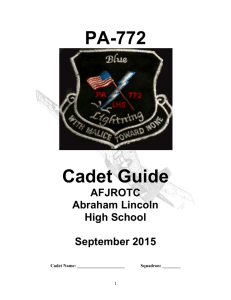course syllabus as1 - Harrison County Schools
advertisement
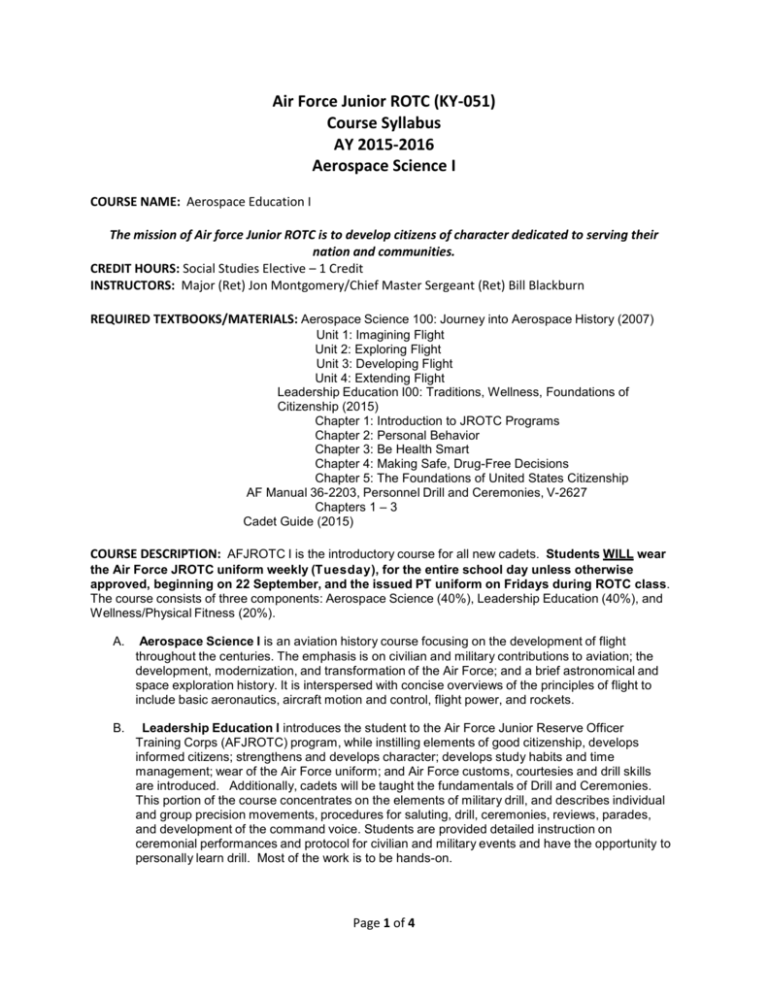
Air Force Junior ROTC (KY-051) Course Syllabus AY 2015-2016 Aerospace Science I COURSE NAME: Aerospace Education I The mission of Air force Junior ROTC is to develop citizens of character dedicated to serving their nation and communities. CREDIT HOURS: Social Studies Elective – 1 Credit INSTRUCTORS: Major (Ret) Jon Montgomery/Chief Master Sergeant (Ret) Bill Blackburn REQUIRED TEXTBOOKS/MATERIALS: Aerospace Science 100: Journey into Aerospace History (2007) Unit 1: Imagining Flight Unit 2: Exploring Flight Unit 3: Developing Flight Unit 4: Extending Flight Leadership Education I00: Traditions, Wellness, Foundations of Citizenship (2015) Chapter 1: Introduction to JROTC Programs Chapter 2: Personal Behavior Chapter 3: Be Health Smart Chapter 4: Making Safe, Drug-Free Decisions Chapter 5: The Foundations of United States Citizenship AF Manual 36-2203, Personnel Drill and Ceremonies, V-2627 Chapters 1 – 3 Cadet Guide (2015) COURSE DESCRIPTION: AFJROTC I is the introductory course for all new cadets. Students WILL wear the Air Force JROTC uniform weekly (Tuesday), for the entire school day unless otherwise approved, beginning on 22 September, and the issued PT uniform on Fridays during ROTC class. The course consists of three components: Aerospace Science (40%), Leadership Education (40%), and Wellness/Physical Fitness (20%). A. Aerospace Science I is an aviation history course focusing on the development of flight throughout the centuries. The emphasis is on civilian and military contributions to aviation; the development, modernization, and transformation of the Air Force; and a brief astronomical and space exploration history. It is interspersed with concise overviews of the principles of flight to include basic aeronautics, aircraft motion and control, flight power, and rockets. B. Leadership Education I introduces the student to the Air Force Junior Reserve Officer Training Corps (AFJROTC) program, while instilling elements of good citizenship, develops informed citizens; strengthens and develops character; develops study habits and time management; wear of the Air Force uniform; and Air Force customs, courtesies and drill skills are introduced. Additionally, cadets will be taught the fundamentals of Drill and Ceremonies. This portion of the course concentrates on the elements of military drill, and describes individual and group precision movements, procedures for saluting, drill, ceremonies, reviews, parades, and development of the command voice. Students are provided detailed instruction on ceremonial performances and protocol for civilian and military events and have the opportunity to personally learn drill. Most of the work is to be hands-on. Page 1 of 4 C. The Wellness/Physical Fitness will incorporate the Cadet Health and W ellness Program (CHW P). The CHW P is an exercise program focused upon individual base line improvements with the goal of achieving a Presidential Physical Fitness standard calculated with age and gender. The goal of the CHWP is to motivate JROTC cadets to lead active, healthy lifestyles beyond program requirements and into their adult lives. Cadets will be given the opportunity to put into practice the wellness concepts that are taught in Leadership Education I. Each week will include different workouts. The "meat" of the program will include exercises which are designed to improve cadet performance on the Presidential Fitness Program final test. Three out of four weeks per month, students will perform calisthenics (those exercises outlined in Wings) with a mixture of running. Normally this will be done by assigning "stations" where a student must perform the prescribed number and type of exercise, then run to the next station. The instructor will ask for ideas for new exercises from the students, and will make every effort to accept student inputs, so long as the exercises are safe and will lead to increased performance on the PFE. (Presidential Fitness Exam). "Off" weeks (one per month) will include team sports designed to improve moral and teamwork, while giving students a workout. These "off" week activities include: flickerball, basketball, kickball, ultimate frisbee, dodgeball and others. Subjects by Semester: First Semester Aerospace Science Unit One, Chapter 1, Lessons 1 and 2 Unit Two, Chapter 2, Lessons 1-3 Unit Two, Chapter 3, Lessons 1-3 Leadership Education Chapter 1, Lessons 1-6 Chapter 2, Lessons 1-5 Drill, Chapters 1-4 Wellness Presidential Physical Fitness Challenge Initial Evaluation Various physical fitness activities to include flickerball, dodgeball, plate exercises Second Semester Aerospace Science Unit Three, Chapter 4, Lessons 1-2 Unit Three, Chapter 5, Lessons 1-2 Unit Three, Chapter 6, Lessons 1-3 Unit Four, Chapter 7, Lessons 1-2 Unit Four, Chapter 8, Lessons 1-2 Leadership Education Chapter 3, Lessons 1-5 Chapter 4, Lessons 1-4 Chapter 5, Lessons 1-5 Drill, Chapters 5-7 Wellness Presidential Physical Fitness Challenge Final Evaluation Various physical fitness activities to include flickerball, dodgeball, plate exercises Page 2 of 4 COURSE OBJECTIVES AND GOALS: Journey into Aerospace History: 1. Know the historical facts and impacts of the early attempts to fly. 2. Know the major historical contributions to the development of flight. 3. Know the contributions of the US Air Force to modern aviation. 4. Know the key events of space exploration history. Leadership Education/Drill and Ceremonies: 1. Know the importance of AFJROTC history, mission, purpose, goals, and objectives. 2. Know military traditions and the importance of maintaining a high standard of dress and appearance. 3. Know the importance of attitude, discipline, and respect, and why values and ethics are so important. 4. Know the importance of individual self-control, common courtesies and etiquette. 5. Know that an effective stress management program improves the quality of life. 6. Know why courtesies are rendered to the United States flag and the National Anthem. 7. Know why it is important to be a good democratic citizen and to be familiar with the different forms of governments. 8. Know the importance of keeping yourself well and helping others stay well. 9. Know the importance of drill and ceremonies. 10. Know basic commands and characteristics of command voice. 11. Apply and execute the concepts and principles of basic drill positions and movements. 12. Know when and how to salute. UNIFORM WEAR: Uniform wear is a large part of the Air Force JROTC program. ALL cadets are required to meet dress and appearance standards and wear the appropriate blue Air Force uniform each Tuesday, beginning on 22 September, from the start of the school day until released. Make-up day for excused absences on uniform day is the following day you return to school. There will be no uniform make-up for unexcused absences. Failing to wear the uniform all day will result in a “0” (zero) grade for that uniform day. Multiple failures to wear your uniform can lead to disenrollment from the course. Cadets are required to wear their issued Physical Fitness uniforms on Fridays unless otherwise directed. Failure to turn in uniforms by the end of the course/year will result in an overall “I” incomplete grade for the course and the vice principal notified. Additionally, the student will be placed on the “Fines/Holds” list until the uniforms are paid for/returned. NOTE: Uniform wear day may be changed to a different day of the week when necessary but you will be given advance notice. As of now, uniforms will be worn on Wednesday, 11 November and on Friday, 23 Oct in place of Tuesday on those weeks. WELLNESS AND PHYSICAL FITNESS: All cadets will be administered an initial Presidential Physical Fitness Exam during the first 45 days of school to determine their fitness level, then administered another exam during the last 30 days of school to determine how much they have progressed. 1. Motivate AFJROTC cadets to lead active, healthy lifestyles beyond program requirements and into their adult lives. 2. Create an individualized training program based on national standards by age and gender. 3. Identify areas of improvements for each cadet. 4. Incorporate a physical training program to reach goals. GRADING PROCEDURES: Grades from the Aerospace Science portion of the course count 40% of the AFJROTC final grade and will be graded by the Senior Aerospace Science Instructor (SASI) (Major Montgomery). The Leadership Education portion of the grade counts 40% of the final grade and will be graded by the Aerospace Science Instructor (ASI) (Chief Blackburn). The wellness portion of the Page 3 of 4 program counts for the remaining 20% of the final grade and will be graded by the SASI and/or ASI. Drill will be evaluated by the ASI and the SASI. HABITUAL NON-WEAR OF THE UNIFORM AND FAILURE TO MAINTAIN STANDARDS WILL RESULT IN A FAILING GRADE AND DISMISSAL FROM THE PROGRAM. Grades will be computed in accordance with standard district grading policy. - - Where your grade will come from o PT o Uniform Inspection o Aerospace Science Unit Exams o Aerospace Science Chapter Exams o Leadership Education Chapter Exams o Leadership Education Lesson Quizzes o Semester Exam o End of Course Grading Scale GRADE A B C D F 100 points each week 100 points each week 100 points each 100 points each 100 points each 100 points each 100 points 10% of total grade Percentage Required 92% or above 91% - 83% 82% - 74% 73% - 65% 64% and below EXPECTATIONS FOR CADETS 1. Follow the chain of command. DO NOT GO DIRECTLY TO THE CADET GROUP/CC WITHOUT YOUR FLT/CC WITH YOU. 2. Always use the titles sir/ma’am when addressing AFJROTC staff and senior ranking cadets. 3. Be on time. Don’t be late to class, scheduled events, practices, etc. 4. Always bring your required items to class (notebook, pen/pencil, textbook, etc). 5. Wear the correct uniform on the appropriate day. 6. Place personal belongings under your table – nothing in the aisle. 7. Raise your hand and wait to be acknowledged; do not talk without permission. 8. Listen respectively and attentively to the speaker/presenter or fellow cadets when they are speaking. 9. Treat others with mutual respect. Profanity, vulgar language, racial or ethnic slurs, derogatory comments, sexual harassment, or harassment of any fellow cadet or student will not be tolerated. 10. Remain in your seat unless given permission to move about the room 11. Remain professional; do not sit on desks, tables, trash cans, etc. 12. Unauthorized personnel are not allowed in the staff offices. 13. Always use the trash can to dispose of trash. If you see trash on the floor, clean it up. 14. No eating, drinking and ABSOLUTELY no CHEWING GUM in the classroom. 15. Wearing hats or sunglasses indoors is prohibited. 16. Maintain loyalty to the Corps, school, and your values. 17. No horseplay in the AFJROTC areas. 18. Maintain self-control and your self-respect at all times. 19. Do not disrespect instructors, higher-ranking cadet officers and NCOs. 20. No touching other students; keep your hands to yourself. 21. NO CELL PHONES ARE TO BE USED DURING CLASS OR CADET MEETINGS. Page 4 of 4
